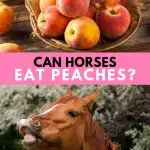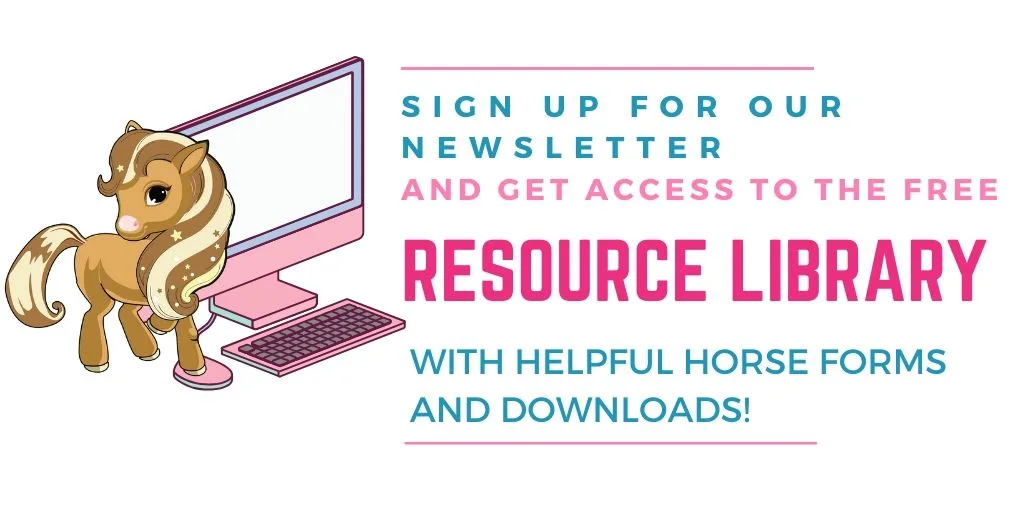While the leaves on a peach tree are extremely dangerous for horses, you may be shocked to learn that peaches themselves are actually safe for your horse to eat as a treat.
Can horses eat peaches?
Horses love to eat peaches and can safely do so if they are fed in limited quantities and the pits are removed. Peaches are full of nutrients that are beneficial to horses.
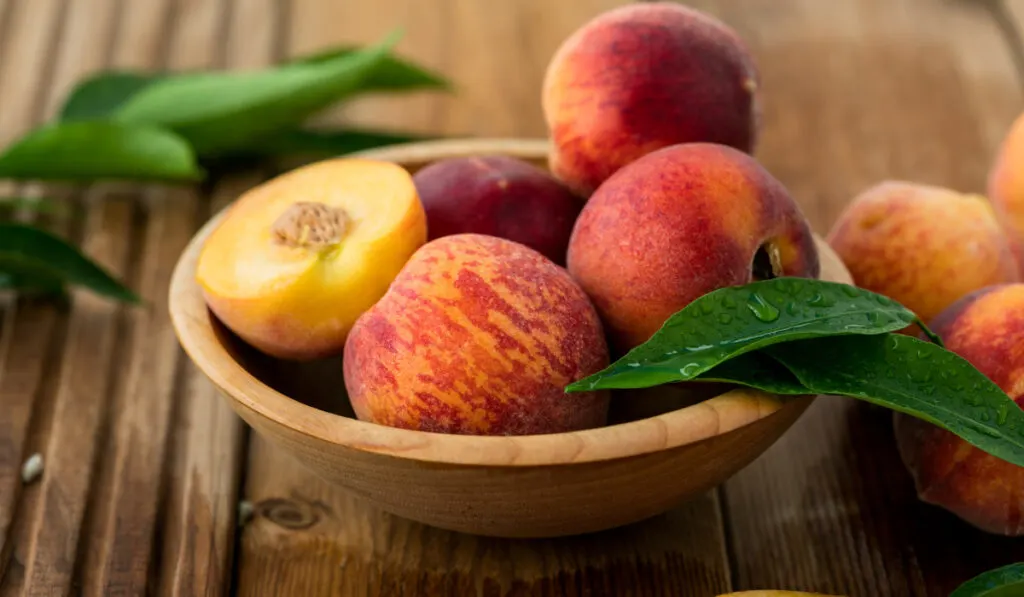
The pit of a peach can be extremely dangerous for a horse to eat for various reasons. You should always take extra precautions if you plan to feed peaches to your horse.
Peaches are full of nutrients and vitamins that are very beneficial to your horse’s wellbeing. With that said, you should introduce any new treats to your horse gradually and monitor them for any adverse side effects. The tips provided here will help you figure out if peaches are an option for your horse.
Table of Contents
Are Peaches Safe for Horses?
As long as you remove the pit from the peach and make sure there are not any peach tree leaves stuck to it, the peach is very safe for your horse to eat, as long as the horse doesn’t suffer from any metabolic disorders.
Peaches contain vitamin A and vitamin C, both antioxidants that help to decrease inflammation. They also are a quality source of both potassium and omega-fatty acids. They are low in calories and contain 2.6 grams of dietary fiber in each large-sized peach. (Self.com)
Keep in mind that peach pits and peachtree leaves are toxic to horses.
Peach Trees in Pastures
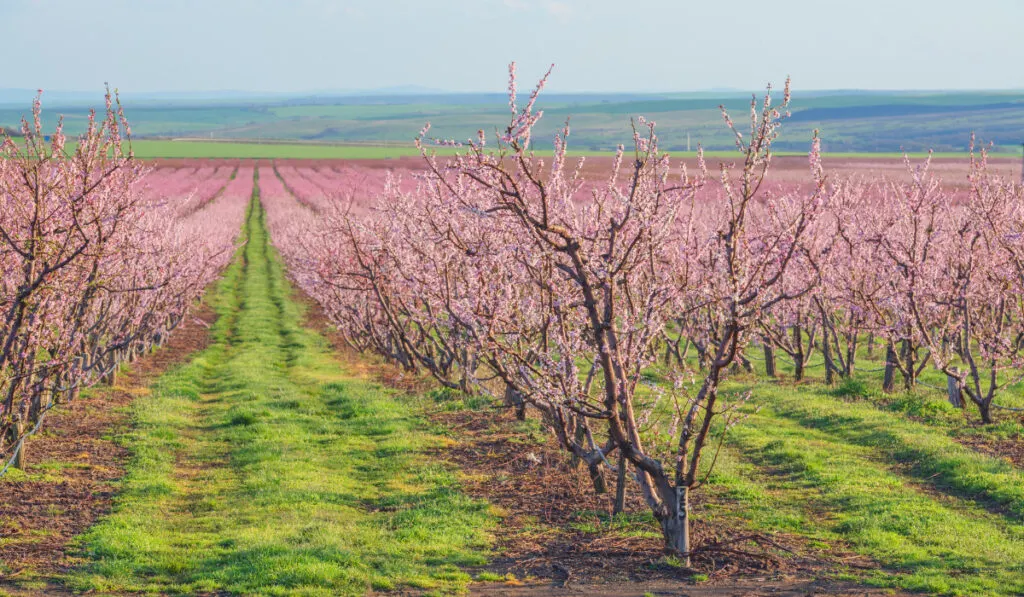
You should not have horses in a pasture that contains a peach tree, especially if it has fallen.
It is very dangerous and there is a good chance that your horse will either get extremely sick from eating too many ripe peaches or he could be poisoned by the leaves when they fall on the ground.
It is also very possible for a peach tree to accidentally fall due to extreme weather. This is very dangerous as many horses will eat the leaves off of a fallen tree. It is not worth the potential loss to keep a horse inside a pasture with a peach tree.
You should remove the horse from the pasture or have the tree professionally removed during the winter when there are no leaves left on it.
You can bring your horse back only after you are sure there are no wilted peach tree leaves or peaches left on the ground. (theHorse.com)
Peach trees are members of the Prunus family of trees. The stones, or pits, in these fruits, can produce toxic amounts of cyanide. The leaves on the treat also contain amygdalin, a substance that can produce cyanide, especially when the leaves are damaged and begin wilting.
When a horse eats the leaves of a peachtree, there is a strong possibility that they will have cyanide poisoning. The effects are quick and can result in fatalities in a matter of days.
Symptoms of Possible Cyanide Poisoning in Horses
Signs to look out for include:
- Rapid heart rate
- Labored breathing
- Dilated pupils
- Shock
If you ever suspect that your horse is suffering from cyanide poisoning, you should contact a vet immediately.
While the pits do not contain huge amounts of amygdalin, they can still be dangerous in large amounts and they can also cause a horse to choke due to their size. Therefore, it is best to consider pits just as toxic as peach tree leaves, just to be safe. (theHorse.com)
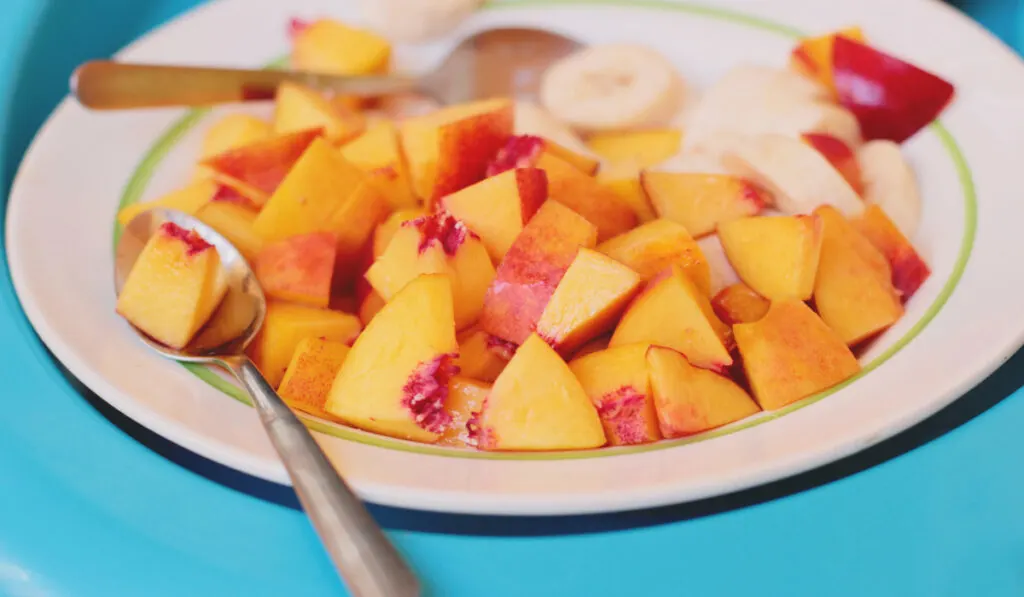
Preparing Peaches for Your Horse
The first and most important thing that you should do when preparing a peach for your horse is to remove the pit. As said before, the pit can be very dangerous for your horse.
Make sure you throw the pit away in a location that your horse cannot find it. After you remove and dispense of the pit, you can cut up the peach however you would like to feed to your horse.
Peaches are pretty easy to chew for horses, but it is always safe to keep the pieces small to prevent the possibility of choking. Some horses, regardless of their age, eat their foods too quickly and can easily choke. The smaller the pieces, the less likely this can happen.
Most healthy horses without dental issues will have no problem eating typical-sized slices of peaches.
Remember to Limit Consumption
Horses are practically famous for their digestive sensitivities and all horse owners should be wary of adding any new foods to their horse’s diet.
Although peaches are healthy for most horses, that doesn’t mean that you should feed them a lot of peaches in a single day. On the contrary, you should limit their peach treat intake to just a couple peaches per week and no more than one peach in a day.
Some horses may do okay eating more than one peach per day, but it is always better to err on the side of caution. Too much of any food can cause severe digestive issues in horses.
Feeding Peaches to Older Horses
Peaches are a relatively soft fruit and they may be a great option for your senior horse. Many senior horses develop dental issues as they age and cannot chew some foods properly.
If this sounds like your older horse, then you should try feeding them peach slices as a treat. Always consult your vet before adding any treats, especially fruits, to your senior horse’s diet.
3 Things to Avoid When Feeding Peaches to Horses
Avoid processed peaches, including dried or canned peaches.
You should never feed your horse any processed peach foods including canned peaches, dried peaches, or peach-flavored foods.
These foods are processed in a plant and they often have lots of extra sugar and various additives that help preserve their freshness.
These are not things that are healthy for humans, much less for our horses. Usually, the process these foods go through removes most of the natural nutrients, rendering them unhealthy. Stick with the natural fruit and your horse will adore you for it.
Avoid feeding peaches to horses with equine metabolic syndrome.
Peaches contain a moderate amount of sugar and carbohydrates. Due to this, you should not feed them to your horse if it suffers from metabolic disorder including insulin-resistance.
A large peach contains 17.3 grams of carbohydrates and about 14.7 grams of sugar. While this may not seem high, it is very high for a horse that cannot handle glucose properly.
If your horse has equine metabolic syndrome (EMS), you should find a treat that is more suitable for them instead of peaches. (theHorse.com)
Don’t feed peaches to horses with HYPP.
A large peach contains approximately 333 milligrams of potassium, which is high for a horse treat.
While this is okay for most horses, those that have hyperkalemic periodic paralysis (HYPP) should never eat peaches.
Horses with HYPP have to avoid eating foods that contain potassium. Any rise in their potassium levels can spell disaster for these horses. (AAEP.org)
Important Things to Remember
- Peaches are safe for most horses but peach tree leaves and pits are not!
- Never feed peaches to horses that have HYPP or EMS.
- Don’t feed your horse processed peaches, stick with fresh fruit instead.
- Talk to your vet before adding peaches to your horse’s diet.
- Add any new treat gradually and monitor your horse for side effects.
Final Thoughts
Many horse owners disagree on whether or not peaches are safe for horses. The truth is, they are safe, but the leaves on the tree they come from and the pit inside them are not.
Many horse owners avoid feeding peaches to their horses because of the toxicity in the pits and leaves. It is important to know that feeding peaches (minus the pit) to your horse in moderation is safe, as long as they don’t have HYPP or EMS.
If you aren’t sure, there is no reason to proactively buy a peach for your horse. If you happen to have a peach tree, you can certainly incorporate the fruit as an occasional treat. Please also remember that if there is a peach tree on your property, make sure there is no way that your horse can get to it.

